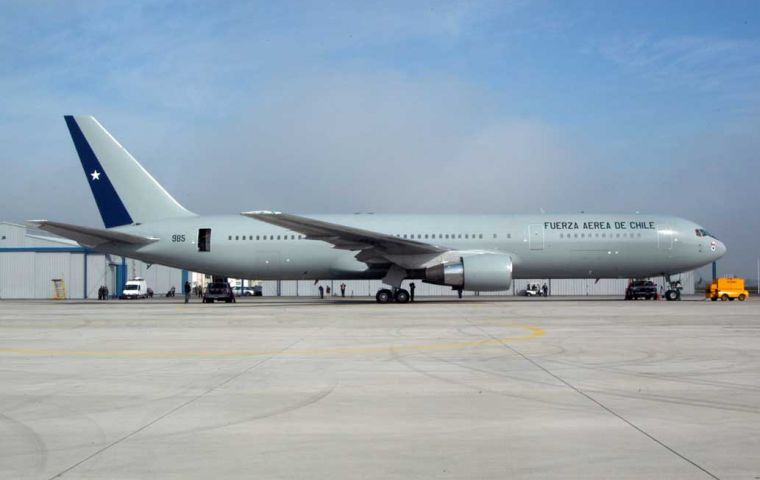MercoPress. South Atlantic News Agency
Chilean presidency changes ageing 707 with Boeing 767-300
 Chilean Air Force 767-300
Chilean Air Force 767-300 The Chilean Air Force formally presented last weekend the new presidential aircraft, a Boeing 767-300ER which cost 30 million Euros and will enable Chilean leaders to reach any point in the world.
Although 14 years old, the Chilean Air Force One has been refurbished and has a flight autonomy of 11.000 kilometers, with capacity for 280 passengers. She will replace the ageing Boeing 707, built in 1968 and which still is used to transport President Michelle Bachelet. The aircraft was originally delivered to Russia's Aeroflot in 1994 and in 1999 was sold to Transworld Airlines. Two years later American Airlines took over the company and in November 2003 the Boeing 767 was sold to the Portuguese charter line Euroatlantic Airways. The Portuguese company then leased the aircraft to Argentina's Southern Winds from January 2004 to September 2005, when the company went bust. In 2006 she was leased to Virgin Nigeria and the following year to Air India until a year ago when it was returned to Euroatlantic, which only operated her for eight flights in twelve months. Ms Bachelet will make her inaugural presidential trip in the new aircraft when she flies to New York next September 20 for the United Nations annual General Assembly. The ageing Boeing 707 has been an embarrassment for Chilean presidents since on more than an occasion she had to be grounded for mechanical reasons. The new Boeing 767-300ER has a double purpose, not only can she be converted for presidential travel but also will be used to transport government or military personnel. UN warns of climate change impact on water resources The chief of the United Nations meteorological agency called for weather forecasts to play a greater role in planning for economic development and poverty reduction because of the impact climate change has on water resources. Michel Jarraud, the Secretary-General of the World Meteorological Organization, WMO, told the World Water Congress that the agricultural, energy, tourism and health sectors are among those most affected by the impact of climate change due to drought, deterioration in water quality, increased run-off and an increase in the salinization of ground water as a result of rising sea levels. "Mainstreaming climate change in decision-making processes will therefore be central to all development and poverty alleviation efforts," he said at the meeting, held in Montpellier, France. Mr. Jarraud reminded attendees of the summit that six of the eight Millennium Development Goals, MDG, relate to water resource management, and that severe flooding, drought and cyclones caused by climate change seriously obstruct efforts to meet the MDG by 2015. WMO has launched an appeal for funding to set up hydrological information systems that can provide timely, accurate and comprehensive water resources information and support economic development through better land and water resource strategy planning. The growing demand for a diminishing water supply is among the challenges to resource management. One sixth of the world's population, mostly in rural areas, on small islands, regions dependant on water from glaciers and snow melt, is adversely affected by the shortage of ground water. Adding to the challenges for water resource management is the increasing scarcity of drinking-water for people living in many cities due to falling levels of low flow rivers and rising sea levels, as well as the increase mortality rates for waterborne diseases, such as malaria and cholera, in the wettest and driest regions. The WMO, in a press release, predict economic and social pressures will add to the growing competition for water resources between food production and other agricultural sectors including the production of bio-fuels in the next few decades.




Top Comments
Disclaimer & comment rulesCommenting for this story is now closed.
If you have a Facebook account, become a fan and comment on our Facebook Page!